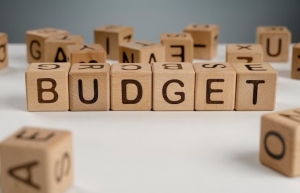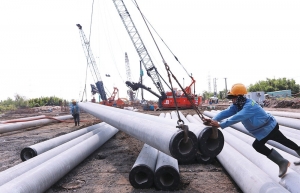Balancing act underway with state budget revenues
According to the General Statistics Office (GSO), in the first 11 months of 2023, the country’s total state budget revenue is estimated to come at nearly $65 billion, down 7.1 per cent as compared to the same period last year.
 |
| Balancing act underway with state budget revenues, illustration photo/ Source: freepik.com |
In which domestic revenues are estimated to sit at nearly $48.84 billion, down 3 per cent. The 10-month reduction rate was 5.9 per cent on-year – meaning enterprises have become less difficult.
The 11-month revenues from crude oil exports, all coming from PetroVietnam, are estimated to stand at $2.4 billion, reflecting an on-year fall of 19.3 per cent as compared to the corresponding period last year.
However, Binh Son Refining and Petrochemical is reported to have exceeded all production and business plans for this year. So far this year, it is estimated to have produced more than 6.7 million tonnes of products, achieving 131 per cent of the year’s plan. Its total revenue reached more than $5.66 billion, with the company contributing $647.68 million to the state coffers. These achievements have contributed to the good performance of PetroVietnam so far this year.
The Ministry of Finance has also reported that in the first 11 months of this year, state budget revenues from export and import activities are estimated to hit about $63.3 billion, down 22.4 per cent on-year.
During January-November 15, Vietnam’s export revenue is estimated to reach $306.06 billion, representing an on-year decrease of 6.4 per cent, and the nation’s total import turnover is estimated to come at $281.62 billion, down 11.7 per cent on-year.
Meanwhile, in the first 11 months of this year, Vietnam’s total state budget expenditure is estimated to touch over $63.3 billion, up 10.9 per cent on-year, ensuring demands for socioeconomic development, national defence and security, state management, and payment of due debts, as well as timely payments for state budget beneficiaries stipulated by the law, said the GSO.
The total state budget in the first 11 months of this year saw a surplus of $1.7 billion, far lower than the $12.26 billion recorded in the same period last year.
However, in a November report submitted to the National Assembly (NA) by the government, it is estimated that for the entire 2023, the economy will suffer from a state budget deficit of about $17.55 billion, with total revenue of around $68.35 billion, and total spending of about $85.9 billion.
“It is expected that in 2023, the total budget deficit will be about 4 per cent of GDP, lower than the NA’s permissible limit of 4.42 per cent of GDP. The public debt will be 39-40 per cent of GDP, ensuring that it will still stand at the permissible limit,” said Minister of Planning and Investment Nguyen Chi Dung.
One of the expansion of the state budget expenditure is ascribed to the country’s policies on continued extension of payment of taxes and reduction in registration fees for domestically manufactured automobiles, in addition to a continued decrease of 2 per cent VAT on many items, as well as a reduction in land rental. “This aims to help enterprises and individuals get out of difficulties and save costs, and to recover production and business activities,” said Minister Dung.
According to the government’s report, it is calculated that the scale of all policy packages on exempting, reducing, and extending taxes and fees that have and will continue to be enacted in 2023 will be valued at around $8.44 billion – including $3.33 billion for exemption and reduction, and $5.11 billion for extension.
Total money that was already exempted, decreased, and extended in the first nine months of this year amounted to as much as $6.43 billion – including $2.09 billion for exemption and reduction, and $4.34 billion for extension.
For example, the government reported that the VAT reduction from July to October has helped provide a financial support worth $658.2 million for businesses and individuals, contributing to decreasing prices of services and goods, therefrom helping to boost production and business activities and generate employment.
Over a week ago, the NA decided to keep the VAT rate at 8 per cent until July 2024 for goods and services subject to a 10 per cent rate, in order to “contribute to reducing prices of goods and services to promote production and business, generating more employment for labourers”.
It is estimated that this continued VAT reduction will cause a drop in the state budget revenue of $176.1 million a month, meaning $1.05 billion in the first half of 2024. It is estimated that from July to the end of this year, the estimated reduction of state budget revenue from domestic activities each month will likely be $107.6 million.
The government has set a target that in 2024, total state budget revenue and expenditure will be about $69.62 billion and $86.47 billion, respectively – with a state budget deficit of $16.85 billion or about 3.6 per cent of GDP.
| In Vietnam, fiscal policy is expected to become expansionary over the next year to boost domestic demand. Temporary tax deferrals, cuts in environmental taxes, and cuts to VAT rates and car registration fees in the second half of 2023 will also provide some relief to firms and households. However, frequent changes to tax rates and excessive use of deferrals add uncertainty to the system and can undermine tax collection. Some of the cuts are regressive and negatively impact climate and congestion. Instead, policies could focus on spending to address infrastructure and social needs. Vietnam’s medium-term strategy, including fiscal rules, provides a medium-term anchor to ensure sustainable debt. Further fiscal support could be considered, especially if the economic recovery disappoints. Given the slowdown and the constraints faced by monetary policy, going forward, fiscal policy can take a leading role in supporting aggregate demand. For instance, the government could scale up social safety nets, and consider cash transfers to provide swift relief to poorer households. Building on successful fiscal consolidation in recent years, there is fiscal space to provide further support. If the current turmoil proves more damaging to the economy and the financial sector, targeted support could be considered, including to help real estate developers restructure. To contain costs, it is recommended that any support goes through the budget, is temporary, and there are mechanisms in place to control and monitor risk exposure from guarantees or other contingent liabilities. Source: International Monetary Fund |
 | Revenue rises remain tough despite budget surplus Despite a surplus in the state budget this year so far, both revenues and expenditures are contracting in many economic sectors, with the former outnumbering the latter due to a lower-than-expected pace of developmental investment. |
 | State budget revenues under pressure amid tough economy The state budget has recorded a deficit for the first time so far this year, largely caused by a rise in public investment disbursement, with a lower-than-expected state budget revenue due to difficulties across the economy. |
What the stars mean:
★ Poor ★ ★ Promising ★★★ Good ★★★★ Very good ★★★★★ Exceptional
 Tag:
Tag:
Related Contents
Latest News
More News
- Private capital funds as cornerstone of IFC plans (February 20, 2026 | 14:38)
- Priorities for building credibility and momentum within Vietnamese IFCs (February 20, 2026 | 14:29)
- How Hong Kong can bridge critical financial centre gaps (February 20, 2026 | 14:22)
- All global experiences useful for Vietnam’s international financial hub (February 20, 2026 | 14:16)
- Raised ties reaffirm strategic trust (February 20, 2026 | 14:06)
- Sustained growth can translate into income gains (February 19, 2026 | 18:55)
- The vision to maintain a stable monetary policy (February 19, 2026 | 08:50)
- Banking sector faces data governance hurdles in AI transition (February 19, 2026 | 08:00)
- AI leading to shift in banking roles (February 18, 2026 | 19:54)
- Digital banking enters season of transformation (February 16, 2026 | 09:00)





















 Mobile Version
Mobile Version